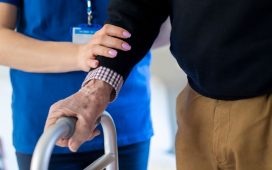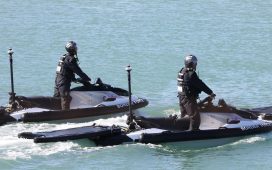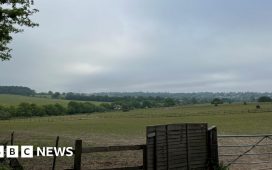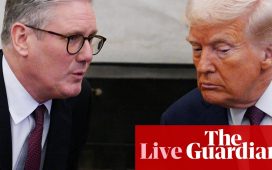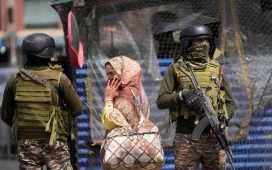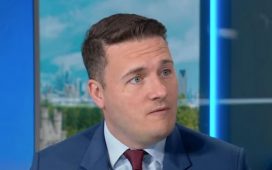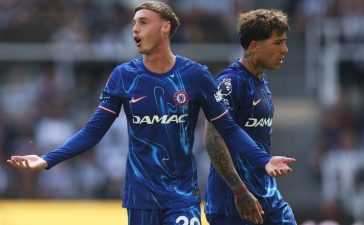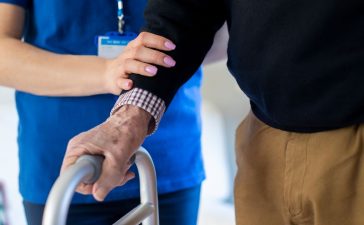Key events
SDLP leader Colum Eastwood says “there isn’t enough money in Stormont” and that the health service is “at the point of collapse”. He says the SDLP are happy to work with other parties as the issue is so important, but adds: “Where are these decisions being taken? At Westminster.”
“We need to go with one single voice and ask the British government to properly fund this health service,” says Eastwood.
Robbie Butler, deputy leader of the Ulster Unionist party (UUP), says health is the “number one topic on the doorstep”.
He’s interrupted trying to answer, but says he agrees that the “chronic underfunding of the health service is absolutely important”. Abstentionism in Stormont has also really affected health services, says Butler. He says the UUP “didn’t take their players off the pitch”.
Butler adds: “The budget doesn’t take into account this year’s pay rise for hard working staff.”
Mills asks where the executive plan is to cut waiting lists and transform services. Naomi Long, leader of the Alliance party, says it is for the Department of Health and the minister of health to have a plan. She says it is for them to bring a plan to the executive.
She also takes issue with the £184m quoted. Long says all departments should be funded fairly if “we’re to have a healthier, happier and safer society”. She compares the budget increases of health and education against the amount for justice.
Tara Mills asks DUP leader Gavin Robinson where he is cutting the £184m that Kellie mentioned. He denies that there will be a cut of £184m to the health budget. Robinson says the figure quoted comes from the end of the year last year rather than at the start.
Robinson says the DUP have highlighted that “Northern Ireland doesn’t get sufficient funding to provide public service that we need”. He adds that there has been an allocation of £450m to the Department of Health, which Robinson says is half of a £950m additional funding for Northern Ireland.
Question one: Health service budget
Question one: How do the parties justify voting to cut the health service budget by £184m?
Kellie from Belfast, in the audience, asks the first question of the debate.
Sinn Féin’s Chris Hazzard answers first. He says there is an understanding that after 14 years of Tory austerity that public services have been “absolutely devastated”. Hazzard says that the most significant thing is that the British government has recognised that Stormont has been underfunded.
Northern Ireland politicians general election TV debate begins
BBC journalist Tara Mills opens the debate from Belfast. She explains that all the leaders of the five main political parties in Northern Ireland were invited to take part in tonight’s debate.
Speaking at a Reform UK event in Boston with party leader Nigel Farage, chairman of the party Richard Tice said that the racist comments discovered by a Channel 4 investigation during the Reform campaign were “inappropriate”.
Tice said:
We put a statement out and it’s all self-explanatory in the statement.
The reality is that we’re a fast-growing movement, and when you’ve got unpaid volunteers, some people behave inappropriately. And they’re gone.”
Speaking at the Hubberts Bridge Community centre in Boston, Lincolnshire, with local candidate Richard Tice, about candidates Farage said that his party is not “perfect”. According to the PA news agency, Farage said:
We’ve had one or two candidates that have said things they shouldn’t have said. In most cases they’re just speaking like ordinary folk.
They’re not part of the mainstream political Oxbridge speak, we understand that. In some cases one or two people let us down and we let them go.
Well, compare that to the international price fixing and betting ring that is the modern day Conservative party.”
In less than half an hour politicians from Northern Ireland’s five largest political parties will take part in a general election TV debate. The five taking to the podiums this evening are:
-
Gavin Robinson, leader of the Democratic Unionist party (DUP).
-
Chris Hazzard, Sinn Féin MP candidate.
-
Colum Eastwood, leader of the Social Democratic and Labour party (SDLP).
-
Naomi Long, leader of the Alliance party.
-
Robbie Butler, deputy leader of the Ulster Unionist party (UUP).
According to the BBC, the five politicians have all arrived and are getting ready. Audience members have also been taking their seats, with some of them preparing to ask questions which each of the politicians will then take turns answering.
Nigel Farage says he is ‘dismayed’ by Reform campaigner comments
Reform UK leader and Clacton candidate Nigel Farage has reacted to footage recorded by an undercover reporter working for Channel 4. In the footage, Reform UK canvasser Andrew Parker spoke about migrants coming ashore at Deal in Kent, used a racial slur against Rishi Sunak and labelled Islam a “disgusting cult”.
Responding to the report, Farage said in a statement:
I am dismayed by the reported comments of a handful of people associated with my local campaign, particularly those who are volunteers. They will no longer be with the campaign.
The appalling sentiments expressed by some in these exchanges bear no relation to my own views, those of the vast majority of our supporters or Reform UK policy. Some of the language used was reprehensible.
Reform UK is a party for everybody who believes in Britain. I am proud that our supporters, candidates and national campaign team come from all backgrounds and identities.
I would be interested to know whether Channel 4 is subjecting the grassroots volunteers of all the political parties to similar subterfuges, or whether Reform UK has been singled out for special attention.”
Explainer: How the general election will be fought in Northern Ireland

Rory Carroll
If you’re wondering how the general election will be fought in Northern Ireland, Rory Carroll has you covered there too.
Here is his analysis, written shortly after the general election date was announced, on what going to the polls on 4 July could mean for Northern Ireland:
The general election will destabilise Northern Ireland’s government just as it was beginning to offer a sense of political normality. The campaign could decapitate the Democratic Unionist party (DUP) and undermine its delicate truce with Sinn Féin at Stormont, putting fresh pressure on the region’s brand of power sharing.
The executive was still finding equilibrium after being revived in February after a two-year hiatus. It briefly wobbled last month when Jeffrey Donaldson resigned as leader of the DUP in the wake of sex abuse charges spanning 21 years, but Sinn Féin’s first minister, Michelle O’Neill, and the DUP’s deputy first minister, Emma Little-Pengelly, steered it through the crisis. The election will present a sterner challenge.
The DUP may field Little-Pengelly to run for Donaldson’s Lagan Valley seat, which he is vacating and which the party risks losing to Alliance. That would remove her from Stormont.
The DUP’s interim leader, Gavin Robinson, risks losing his East Belfast seat to Alliance, especially if Naomi Long, Alliance’s leader and the justice minister, runs. Even if Robinson holds on, a hardline DUP faction that seethes at post-Brexit trading arrangements and has little love for Stormont may try to seize the leadership after the election.
Robin Swann, the Ulster Unionist health minister, is to step down to try to become MP for South Antrim, leaving the executive’s most important and problematic portfolio in disarray.
The political climate will probably harshen as nationalist and unionist candidates vie to rally their grassroots with wedge issues such as the Irish language and the legacy of the Troubles.
Few if any parties will mourn the departure of Chris Heaton-Harris, the Northern Ireland secretary, who is stepping down as a Tory MP.
Back to Northern Ireland, the Guardian’s Rory Carroll has written about the key election issues in Belfast East for the path to power series.
In Northern Ireland’s capital, the election is being fought between unionists and ‘neithers’ – with poverty, crumbling public services and crime at the forefront, writes Carroll.
You can read the full piece here:
Reform UK campaigner in Clacton recorded calling for people fleeing war to be used as ‘target practice’
A Reform UK campaigner in Clacton, Essex, has called for people fleeing war or persecution to be used as “target practice” and used a racial slur against the prime minister.
An undercover reporter working for Channel 4 has recorded footage of canvasser Andrew Parker talking about migrants coming ashore at Deal in Kent.
In a statement to Channel 4 news, Parker said:
I would like to make it clear that neither Nigel Farage personally or the Reform party are aware of my personal views on immigration.
I have never discussed immigration with either Nigel Farage or the Reform party and that any comments made by me during those recordings are my own personal views on any subject I commented on.
At no time before I was sent out to canvass did I discuss my personal views with any representative of the Reform party or Nigel Farage.
I would therefore like to apologise profusely to Nigel Farage and the Reform party if my personal views have reflected badly on them and brought them into disrepute, as this was not my intention.
I offered to help the Reform party on their canvassing as I believe that they are the only party that offer the UK voter a practical solution to the illegal immigration problem that we have in the UK.”
General election is ‘not a referendum on me’ or the Conservative party, Sunak says in speech
Speaking near Leeds this evening Rishi Sunak said:
I know why people are hesitant about giving us their support – I’m not blind to the frustrations that people have with me, with our party.
It’s been a difficult few years with Covid, with the war in Ukraine, we haven’t got everything right and we haven’t made as much progress in every area as we would have liked.
But this is not a referendum on me, on the Conservative party. This is not a byelection. This is a choice about the future of our country and a choice with profound consequences for you, your families and our nation.
Just think what a Labour government would actually mean and in fact, sometimes it’s quite hard because Keir Starmer’s changed his mind on almost every position that he’s taken and in these uncertain times, this country needs leadership that has the courage of its convictions, someone who stands by what they’ve said, that’s how you deliver for people.”
Rishi Sunak has been giving an evening speech in Leeds, Yorkshire.
According to the PA news agency, the prime minister began his speech by telling campaigners:
Friends, we have urgent work to do. We have one week to save Britain from a Labour government – now, a Labour government that would raise everyone’s taxes by £2,000, that would shunt our politics to the left, that would change the rules so that they’re in power for decades.
We can’t let Britain sleepwalk into that.
It is our job, it is our duty over the next week to wake people up to that danger, so I say to you, I say to every Conservative, get out there and fight for every vote, fight for our values and fight for our vision of Britain.”
The BBC are getting set for tonight’s debate. BBC journalists Tara Mills and Darran Marshall have randomly drawn the order in which the politicians from Northern Ireland’s five largest parties will stand.
From left to right podiums, this is how it will look: Colum Eastwood (SDLP), Chris Hazzard (Sinn Féin), Naomi Long (Alliance), Gavin Robinson (DUP) and Robbie Butler (UUP).
Opening summary
Welcome to the latest politics live blog, which later will focus on tonight’s general election TV debate with politicians from Northern Ireland’s five largest political parties.
The hour-long debate will begin at 9pm BST and will be broadcast BBC One Northern Ireland, BBC iPlayer and the BBC News channel.
The five politicians taking part are:
-
Gavin Robinson, leader of the Democratic Unionist party (DUP).
-
Chris Hazzard, Sinn Féin MP candidate.
-
Colum Eastwood, leader of the Social Democratic and Labour party (SDLP).
-
Naomi Long, leader of the Alliance party.
-
Robbie Butler, deputy leader of the Ulster Unionist party (UUP).
It will be the second TV debate of the general election featuring Northern Ireland’s five main political parties. The first, the UTV election debate, took place last Sunday and saw the five parties clash over Irish unity, Brexit and Stormont’s budget.
During tonight’s debate, each of the five politicians on stage will be given the opportunity to respond to questions on key general election issues from the audience.

